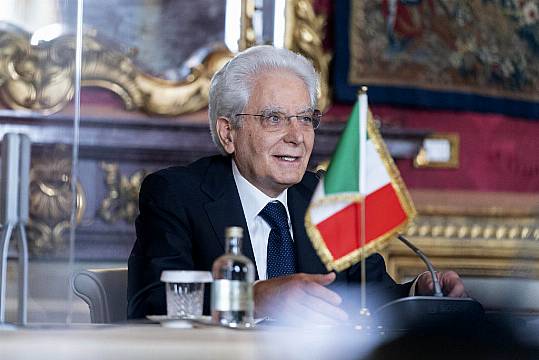Italian president Sergio Mattarella has been elected to a second seven-year term as the country’s head of state, ending a political deadlock lasting days as party leaders struggled to choose his successor.
Earlier on Saturday, legislators had entreated the 80-year-old, who had said he did not want a second term in office, to change his mind and agree to re-election after a vote in parliament and among regional delegates.
The move followed days of fruitless efforts by political leaders to reach a consensus on a candidate.

Mr Mattarella won in the eighth round of voting when he clinched the minimum of 505 votes needed from the eligible 1,009 grand electors.
Applause broke out in the parliament in Rome, prompting the Chamber of Deputies president to interrupt his reading aloud of the ballots.
The count then resumed, with Mr Mattarella’s votes surging well past 670.
Mr Mattarella’s first term ends on February 3.

Ahead of the presidential election this week, Mr Mattarella had repeatedly said he does not want another stint.
He even rented an apartment in Rome to prepare for his move from the presidential palace on top of Quirinal Hill.
But after a seventh round of balloting in six days in parliament failed to yield any consensus on a presidential candidate, party whips and regional governors visited Mr Mattarella at the presidential palace to solicit his willingness to carry on.
Rai state TV said Italian premier Mario Draghi, a non-partisan former chief of the European Central Bank who is leading a pandemic unity government, telephoned party leaders to encourage the lobbying.
Mr Draghi had previously indicted he would be willing to move into the presidential role, but some party leaders featured that would prompt an early election.

Mr Mattarella’s willingness to serve again “is a choice of generosity toward the country”, Democratic Party leader Enrico Letta told a news conference minutes before Saturday’s second, conclusive round of voting began.
“You don’t change a winning team,” former premier Matteo Renzi told reporters about the current leadership with Mr Draghi, a reassuring figure to financial markets, and Mr Mattarella as president.
A chorus of Italian politicians had called for Mr Mattarella to reconsider earlier on Saturday.
Former prime minister Silvio Berlusconi, who heads the centre-right Forza Italia party he founded, said that unity “today can only be found around the figure of President Sergio Mattarella, of whom we know we’re asking a great sacrifice”.

Health minister Roberto Speranza, who heads a small left-wing party, told reporters that Mr Mattarella’s re-election would be crucial for “a context of stability for Italy”.
The head of the populist 5-Star Movement – the parliament’s largest force – former premier Giuseppe Conte, told reporters “Mattarella is the guarantor of everybody, impartial, authoritative”.
Until 2013, no president had served a second term.
Then, a similar political stalemate in several rounds of balloting ended when Giorgio Napolitano, a former Communist leader, agreed to accept a second mandate.
Mr Napolitano resigned in 2015, when he was nearly 90, clearing the way for the election that made Mr Mattarella Italy’s head of state.







